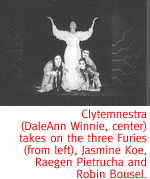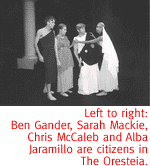

|

Quicksilver Takes On Crime And Punishment, Greek Style.
By Dave Irwin
IT'D BE EASY to accuse young Stuart Bousel of hubris--that
pride which offends the gods--for adapting The Oresteia.
How many 20-year-olds do you know brash enough to rewrite Aeschylus,
one of the world's oldest playwrights? On the other hand, how
many 20-year-olds do you know who'd approach the task by reading
more than a half-dozen translations and then, dictionary in hand,
read the work in the original Greek, as Bousel did?
The Oresteia, also directed by Bousel, is the fifth offering
mounted by Quicksilver Productions since its founding last summer.
The play follows that archetype for the dysfunctional family,
the House of Atrius, through multi-generational murders and retributions.
It's a challenging and sometimes flawed work that nonetheless
is consistently engaging and well worth the effort, both for the
company and the audience. This is not dinner theatre entertainment.
But serious theatre-goers are encouraged to support this production,
and the work of this ambitious troupe.
 The Oresteia was first produced in 458 B.C. As originally
written, it was a half-day combination of three plays, Agamemnon,
The Libation Bearers and The Eumenides, plus a now-lost
satyr-play for comic relief. Bousel has combined the trilogy into
an approximately two-hour work which remains true to the story
and spirit of Aeschylus, though not the staging and traditions
of Greek theatre.
The Oresteia was first produced in 458 B.C. As originally
written, it was a half-day combination of three plays, Agamemnon,
The Libation Bearers and The Eumenides, plus a now-lost
satyr-play for comic relief. Bousel has combined the trilogy into
an approximately two-hour work which remains true to the story
and spirit of Aeschylus, though not the staging and traditions
of Greek theatre.
Understanding the context of those seminal days of theatre makes
clear the Promethian task Bousel took on in creating his adaptation.
Classical Greek theatre found its roots in Dionysian revels (tragedy
comes from the Greek words tragos and ode or "goat
song"). Theatre evolved from a drunken free-for-all in fertility
worship to a series of scripted ritualistic presentations starting
at dawn and concluding at noon. Stock elements such as the deus
ex machina to drop and pluck gods on stage and stylized masks
and costumes were required, as well as a massed chorus to comment
on the action and pray to the gods. In their original form, there
was also music and choreography, none of which has survived.
 The works, attended by tens of thousands, were a combination
of religious ceremony and spectacle, held together by a story.
They were also important teaching tools for a populace still wavering
on the cusp of civilized behavior.
The works, attended by tens of thousands, were a combination
of religious ceremony and spectacle, held together by a story.
They were also important teaching tools for a populace still wavering
on the cusp of civilized behavior.
In The Oresteia, Aeschylus, as the Martha Stewart of his
time, felt compelled to remind folks repeatedly that cooking your
brother's children in a stew and committing cannibalism was no
longer socially acceptable. Indeed, the point of The Oresteia
was the notion that murdering various members of your family because
supernatural beings urged you to might be judged inappropriate
behavior under some circumstances. The drama also introduced the
crowd to then-new concepts of objective justice and trial by jury.
One problem is that the complex historical story, as familiar
to the average ancient Greek as the Seinfeld characters
are to us, requires extensive explanation to be understandable.
(Try explaining why the Soup Nazi is funny to someone who's never
seen Seinfeld.) Taking a quick refresher in the gruesome
legacy of the House of Atrius, as well as the genesis of the Trojan
War, will be helpful for those not already familiar with Greek
literature.
In traditional Greek drama, much of this back-story role falls
to the chorus, a convention that Aeschylus was just beginning
to reshape. Bousel has reduced the chorus to a few lines spoken
in unison for emphasis. Instead, he substitutes exposition by
single characters or explicit action.
"I think the cutting of the chorus is justified," Bousel
explained, "because it's just not applicable to modern times.
The chorus doesn't work for modern audiences, unless it's done
very tongue-in-cheek, or if the chorus is more a part of the play.
There are long paeans that have no significance to the characters
or the plot, they're just remnants of a hundred years prior to
Aeschylus, when drama was a prayer ceremony. Aeschylus broke
away from using the chorus as filler, but he didn't make it all
the way there until Euripides which was written after The
Oresteia. The classicists might want to kill me, but any director
or actor, I think, is grateful."
Bousel, despite is age, is no tyro. He has acted in more than
20 plays, including Macbeth, Mother Courage and Her
Children, and Medea. He has directed several times
already, including The Fantasticks and Quicksilver's first
production, Lysistrata. He has also written three original
plays, two of which have been produced by the Old Pueblo Playwrights
New Play Festival. An English major at Reed College, he's currently
revising a fourth play.
Of his adaptation, he says, "Greek grammar and English grammar
are like apples and oranges. So you lose all the original style.
I tried to keep everything from the original content-wise, but
it's basically my grammar." In retrospect, he admits, "I
think there were a few places where I slipped up and became very
'90s."
 Another minor problem is some unevenness in the 22-member cast's
acting skills. This is to be expected in a company dedicated to
giving young actors an opportunity to hone their craft, and it's
limited to a few of the secondary parts. All of the principals
are completely convincing in their delivery of Bousel's script.
DaleAnn Winnie is marvelously despicable as Clytemnestra, the
wife who plots for a decade to murder her husband for sacrificing
their daughter. Dean Hepker as her consort, Aegisthus, is perfect
as the pawn who would be king. Eric Dominguez as Orestes seems
overly histrionic as the hero caught between doubt and duty, but
that relates to Bousel's conception of the character rather than
Dominguez's abilities. Alba Jaramillo brings range and grace to
her part as the beautiful but doomed Cassandra.
Another minor problem is some unevenness in the 22-member cast's
acting skills. This is to be expected in a company dedicated to
giving young actors an opportunity to hone their craft, and it's
limited to a few of the secondary parts. All of the principals
are completely convincing in their delivery of Bousel's script.
DaleAnn Winnie is marvelously despicable as Clytemnestra, the
wife who plots for a decade to murder her husband for sacrificing
their daughter. Dean Hepker as her consort, Aegisthus, is perfect
as the pawn who would be king. Eric Dominguez as Orestes seems
overly histrionic as the hero caught between doubt and duty, but
that relates to Bousel's conception of the character rather than
Dominguez's abilities. Alba Jaramillo brings range and grace to
her part as the beautiful but doomed Cassandra.
Especially delightful are the three Furies, who are continually
writhing and hissing around the stage in their demand for Orestes'
destruction. Played by Jasmine Koh, Robin Bousel and Raegen Pietrucha,
they add a sense of supernatural insistence that helps drive the
action. Especially effective is the moment when the Furies slip
into darkness whispering Orestes' name menacingly, aided by cast
members strategically placed throughout the entire space to create
a stunning surround-sound effect as the scene fades to black.
Overall, The Oresteia represents a significant achievement
for Bousel. While not a perfect victory, neither is it at all
Pyrrhic--its few failings are small. As a learning experience
for an ambitious and talented young man, it was well worth the
quest. And where hubris is concerned, it's safe to say that Bousel's
muse simply demands more from him than most. The tragedy would
be if he didn't continue to aspire to those heights just beyond
his grasp.
Quicksilver Productions continues its presentation of
Aeschylus' The Oresteia, adapted and directed
by Stuart Bousel, Thursday through Saturday, August 6 through
8. Curtain is 8 p.m. at the Tucson Center for the Performing
Arts, 408 S. Sixth Ave. Tickets are $6, with a $1 discount
for students and senior citizens. For information and reservations,
call 529-2687.

|
 |





